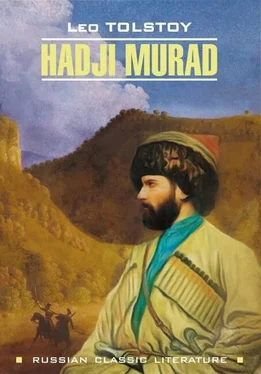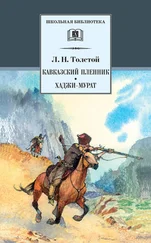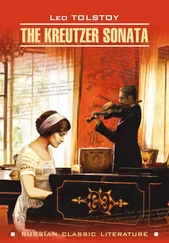On reaching his apartments he smoothed his whiskers and the hair on his temples and the wig on his bald patch, and twisted his mustaches upwards in front of the mirror, and then went straight to the cabinet in which he received reports.
He first received Chernyshov, who at once saw by his face, and especially by his eyes, that Nicholas was in a particularly bad humor that day, and knowing about the adventure of the night before he understood the cause. Having coldly greeted him and invited him to sit down, Nicholas fixed on him a lifeless gaze. The first matter Chernyshov reported upon was a case of embezzlement by commissariat officials which had just been discovered; the next was the movement of troops on the Prussian frontier; then came a list of rewards to be given at the New Year to some people omitted from a former list; then Vorontsov’s report about Hadji Murad; and lastly some unpleasant business concerning an attempt by a student of the Academy of Medicine on the life of a professor.
Nicholas heard the report of the embezzlement silently with compressed lips, his large white hand – with one ring on the fourth finger – stroking some sheets of paper, and his eyes steadily fixed on Chernyshov’s forehead and on the tuft of hair above it.
Nicholas was convinced that everybody stole. He knew he would have to punish the commissariat officials now, and decided to send them all to serve in the ranks, but he also knew that this would not prevent those who succeeded them from acting in the same way. It was a characteristic of officials to steal, but it was his duty to punish them for doing so, and tired as he was of that duty he conscientiously performed it.
“It seems there is only one honest man in Russia!” said he.
Chernyshov at once understood that this one honest man was Nicholas himself, and smiled approvingly.
“It looks like it, your Imperial Majesty,” said he. “Leave it – I will give a decision,” said Nicholas, taking the document and putting it on the left side of the table.
Then Chernyshov reported the rewards to be given and about moving the army on the Prussian frontier.
Nicholas looked over the list and struck out some names, and then briefly and firmly gave orders to move two divisions to the Prussian frontier. He could not forgive the King of Prussia for granting a Constitution to his people after the events of 1848, and therefore while expressing most friendly feelings to his brother-in-law in letters and conversation, he considered it necessary to keep an army near the frontier in case of need. He might want to use these troops to defend his brother-in-law’s throne if the people of Prussia rebelled (Nicholas saw a readiness for rebellion everywhere) as he had used troops to suppress the rising in Hungary a few years previously. they were also of use to give more weight and influence to such advice as he gave to the King of Prussia.
“Yes – what would Russia be like now if it were not for me?” he again thought.
“Well, what else is there?” said he.
“A courier from the Caucasus,” said Chernyshov, and he reported what Vorontsov had written about Hadji Murad’s surrender.
“Well, well!” said Nicholas. “It’s a good beginning!”
“Evidently the plan devised by your Majesty begins to bear fruit,” said Chernyshov.
this approval of his strategic talents was particularly pleasant to Nicholas because, though he prided himself upon them, at the bottom of his heart he knew that they did not really exist, and he now desired to hear more detailed praise of himself.
“How do you mean?” he asked.
“I mean that if your Majesty’s plans had been adopted before, and we had moved forward slowly and steadily, cutting down forests and destroying the supplies of food, the Caucasus would have been subjugated long ago. I attribute Hadji Murad’s surrender entirely to his having come to the conclusion that they can hold out no longer.”
“True,” said Nicholas.
Although the plan of a gradual advance into the enemy’s territory by means of felling forests and destroying the food supplies was Ermolov’s and Velyaminov’s plan, and was quite contrary to Nicholas’s own plan of seizing Shamil’s place of residence and destroying that nest of robbers – which was the plan on which the dargo expedition in 1845 (that cost so many lives) had been undertaken – Nicholas nevertheless attributed to himself also the plan of a slow advance and a systematic felling of forests and devastation of the country. It would seem that to believe the plan of a slow movement by felling forests and destroying food supplies to have been his own would have necessitated hiding the fact that he had insisted on quite contrary operations in 1845. But he did not hide it and was proud of the plan of the 1845 expedition as well as of the plan of a slow advance – though the two were obviously contrary to one another. Continual brazen flattery from everybody round him in the teeth of obvious facts had brought him to such a state that he no longer saw his own inconsistencies or measured his actions and words by reality, logic, or even simple common sense; but was quite convinced that all his orders, however senseless, unjust, and mutually contradictory they might be, became reasonable, just, and mutually accordant simply because he gave them. His decision in the case next reported to him – that of the student of the Academy of Medicine – was of the that senseless kind.
The case was as follows: A young man who had twice failed in his examinations was being examined a third time, and when the examiner again would not pass him, the young man whose nerves were deranged, considering this to be an injustice, seized a pen-knife from the table in a paroxysm of fury, and rushing at the professor inflicted on him several trifling wounds.
“What’s his name?” asked Nicholas.
“Bzhezovski.”
“A Pole?”
“Of Polish descent and a roman Catholic,” answered Chernyshov.
Nicholas frowned. He had done much evil to the Poles. To justify that evil he had to feel certain that all Poles were rascals, and he considered them to be such and hated them in proportion to the evil he had done them.
“Wait a little,” he said, closing his eyes and bowing his head.
Chernyshov, having more than once heard Nicholas say so, knew that when the Emperor had to take a decision it was only necessary for him to concentrate his attention for a few moments and the spirit moved him, and the best possible decision presented itself as though an inner voice had told him what to do. He was now thinking how most fully to satisfy the feeling of hatred against the Poles which this incident had stirred up within him, and the inner voice suggested the following decision. He took the report and in his large handwriting wrote on its margin with three orthographical mistakes:
“Diserves deth, but, thank God, we have no capitle punishment, and it is not for me to introduce it. Make him fun the gauntlet of a thousand men twelve times. – Nicholas.”
He signed, adding his unnaturally huge flourish.
Nicholas knew that twelve thousand strokes with the regulation rods were not only certain death with torture, but were a superfluous cruelty, for five thousand strokes were sufficient to kill the strongest man. But it pleased him to be ruthlessly cruel and it also pleased him to think that we have abolished capital punishment in Russia.
Having written his decision about the student, he pushed it across to Chernyshov.
“There,” he said, “read it.”
Chernyshov read it, and bowed his head as a sign of respectful amazement at the wisdom of the decision.
“Yes, and let all the students be present on the drill-ground at the punishment,” added Nicholas.
“It will do them good! I will abolish this revolutionary spirit and will tear it up by the roots!” he thought.
Читать дальше
Конец ознакомительного отрывка
Купить книгу












